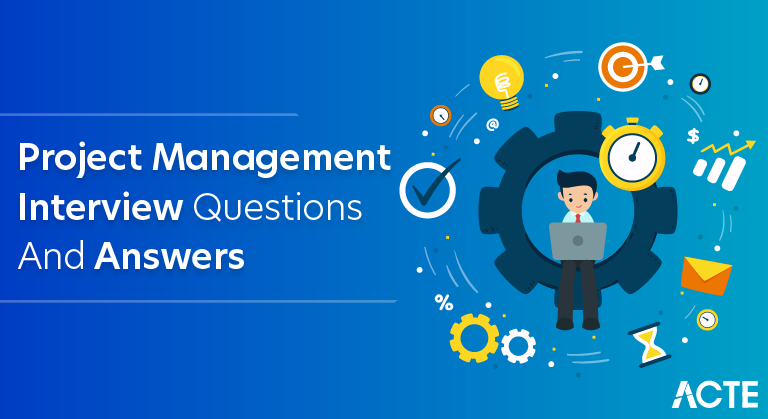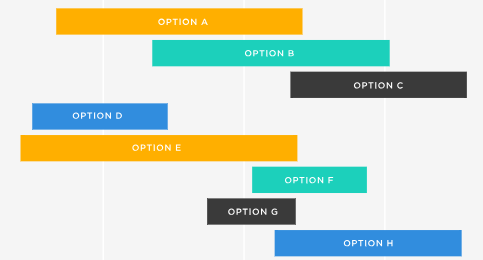
These Project Management Interview Questions are crafted to familiarize you with the types of questions you might encounter in a project management interview. In my experience, skilled interviewers often initiate discussions with fundamental concepts and then explore various aspects based on your responses. The set comprises the top 100 Project Management Interview questions, each accompanied by detailed answers. This resource aims to provide you with comprehensive preparation for a project management interview, covering a wide range of topics within the field.
1. What is project management, and why is it important in organizational success?
Ans:
The discipline of arranging, planning, and carrying out projects to meet predetermined objectives is known as project management. It is crucial for organizational success because it ensures efficient use of resources, timely delivery of results, and effective collaboration among team members. Project management also helps in risk mitigation, quality control, and stakeholder satisfaction.
2. How do you initiate a project?
Ans:
Project initiation involves defining the project, setting objectives, identifying stakeholders, and conducting a feasibility study. It includes creating a project charter, which outlines the project’s purpose, goals, scope, budget, and schedule. Effective initiation ensures a clear understanding of project expectations and aligns stakeholders towards a common vision.
3. What is the difference between a project manager and a project leader?
Ans:
| Project manager | Project leader |
|---|---|
| Project manager focuses on planning, organizing, and controlling project activities | Project leader inspires and motivates the team to achieve goals |
| A project manager emphasizes processes and tasks, ensuring efficiency | Project leader fosters teamwork, innovation, and a positive work culture. |
4. How do you manage modifications to the scope of a project?
Ans:
Scope changes are managed through a formalized change control process. This involves assessing the impact on the project’s timeline, budget, and resources. Communicating changes transparently to stakeholders, obtaining necessary approvals, and adjusting the project plan accordingly helps maintain control and ensures everyone is on the same page.
5. What is the significance of a Work Breakdown Structure (WBS)?
Ans:
- A Work Breakdown Structure breaks down the project into smaller, manageable components. It helps in organizing and defining the total scope of the project, making it easier to plan, allocate resources, and monitor progress.
- WBS facilitates a clear understanding of tasks and their relationships, enhancing overall project management efficiency.
6. How do you manage project risks?
Ans:
Risk management involves identifying, assessing, and mitigating potential risks. This includes creating a risk register, analyzing their impact and probability, and developing risk response plans. Proactive risk management ensures that potential issues are addressed before they become critical, minimizing disruptions to the project.
7. Explain the concept of Critical Path in project management.
Ans:
- Critical Path is essential to prevent delays and ensure the project stays on schedule. The series of steps that establish the least amount of time required for an operation is known as the Critical Path.
- It identifies the longest duration path through a project, highlighting tasks critical for project completion. Managing tasks on the
8. How can a project team’s communication be made sure to be effective?
Ans:
Effective communication involves regular updates, clear expectations, and open channels for feedback. Utilizing collaboration tools, conducting regular team meetings, and establishing a communication plan help in keeping everyone informed. Understanding individual communication preferences and addressing potential conflicts promptly fosters a positive team environment.
9. How do you evaluate the success of a project?
Ans:
Project success is evaluated based on meeting predefined goals, staying within the budget, and adhering to the timeline. Additionally, assessing stakeholder satisfaction, quality of deliverables, and the ability to adapt to changes contribute to a comprehensive evaluation. Continuous improvement through post-project reviews ensures lessons learned are applied to future endeavors.
10. What role does leadership play in project management?
Ans:
- Leadership in project management involves inspiring, motivating, and guiding the team towards achieving project objectives.
- A project manager must exhibit strong leadership skills to foster a positive work culture, resolve conflicts, and adapt to unforeseen challenges.
- Effective leadership ensures a cohesive team, improved communication, and successful project outcomes.
11. Describe the variations between the project management techniques used by Agile and Waterfall.
Ans:
There are two different project management approaches: agile and waterfall. Waterfall follows a linear, sequential approach, while Agile is iterative and emphasizes adaptability. Waterfall is suitable for well-defined projects, while Agile is more flexible, allowing for continuous improvement through feedback loops and frequent reassessment.
12. How do you handle conflicts within a project team?
Ans:
Finding common ground, recognizing disagreement, and actively listening to those who hold different opinions. Implementing a structured approach, such as negotiation or mediation, is crucial. Encouraging open communication, addressing issues promptly, and promoting a collaborative environment contribute to effective conflict resolution, fostering a more productive team dynamic.
13. What role does a Gantt chart play in project management?
Ans:
- A Gantt chart helps with planning, scheduling, and progress tracking by providing a visual representation of project tasks over time.
- Task dependencies, schedules, and milestones are displayed, giving a thorough perspective of the project.
- Gantt charts make it easier to coordinate efforts, identify key path tasks, and communicate.

14. In a project, how do you assign resources and prioritize tasks?
Ans:
Setting priorities entails determining what has to be done first and distributing resources according to project goals. By employing methods such as the Eisenhower Matrix, project managers are able to differentiate between critical and urgent jobs. When allocating resources, skill sets, availability, and workload are taken into account to ensure maximum utilization and effective project execution.
15. Explain the concept of Earned Value Management (EVM) in project management.
Ans:
Earned Value Management integrates project scope, schedule, and cost to assess project performance. It compares the value of work accomplished against the planned cost and schedule. EVM provides insights into project health, helping identify variances and enabling timely corrective actions to keep the project on track.
16. How do you adjust when the scope or requirements of a project change?
Ans:
- Adapting to changes involves a systematic approach. Assess the impact on the project’s timeline, budget, and resources.
- Engage stakeholders for approval, update project documentation, and communicate changes transparently. Flexibility and a proactive mindset are crucial for successfully navigating evolving project requirements.
17. Describe your approach to project risk identification.
Ans:
Identifying project risks requires a thorough analysis of internal and external factors. Conducting risk brainstorming sessions, reviewing historical data, and utilizing risk checklists contribute to a comprehensive risk identification process. Regularly updating the risk register and involving the team in risk assessment enhance the overall risk management strategy.
18. How can project deliverable quality control be ensured?
Ans:
- Quality control involves setting and monitoring project standards. Implementing a quality management plan, conducting regular inspections, and utilizing quality assurance techniques ensure that deliverables meet predetermined standards.
- Continuous monitoring, feedback loops, and process improvements contribute to a culture of quality within the project team.
19. What is the role of a stakeholder in a project, and how do you manage their expectations?
Ans:
Stakeholders play a vital role in a project as they have an interest in its outcome. Managing their expectations involves clear communication, setting realistic goals, and involving them in decision-making processes. Regular updates, feedback sessions, and addressing concerns promptly contribute to maintaining positive stakeholder relationships.
20. How do you promote team collaboration and synergy?
Ans:
Promoting collaboration involves fostering open communication, recognizing individual strengths, and encouraging a collaborative mindset. Team-building activities, clear roles and responsibilities, and creating a supportive work environment contribute to building synergy. Effective teamwork improves problem-solving, innovation, and the success of the project as a whole.
21. Explain the concept of a RACI matrix in project management.
Ans:
A RACI matrix is a responsibility assignment chart that defines roles and responsibilities for project tasks. It outlines who is Responsible, Accountable, Consulted, and Informed for each activity. This tool clarifies communication channels, reduces ambiguity, and ensures accountability throughout the project.
22. How do you manage project dependencies, and why are they important?
Ans:
Project dependencies are managed by identifying, tracking, and sequencing tasks that rely on one another. Understanding dependencies is crucial for maintaining the project timeline. Using tools like dependency matrices and scheduling software helps in visualizing and addressing interdependencies, ensuring a smooth project flow.
23. What is the role of a project sponsor, and how do you engage with them effectively?
Ans:
- A project sponsor provides leadership, support, and advocacy for the project.
- Engaging with them involves regular updates, seeking guidance on critical decisions, and aligning project goals with organizational objectives.
- Effective communication and addressing sponsor expectations are key to a successful partnership.
24. How do you handle resource constraints in a project?
Ans:
Resource constraints require a strategic approach. Identifying alternative resources, prioritizing tasks, and optimizing resource allocation are essential. Clear communication with stakeholders about potential delays and exploring options for additional resources or outsourcing can help mitigate the impact of constraints on project delivery.
25. Describe the project management concept of the Triple Constraint.
Ans:
- The Triple Constraint, also known as the project management triangle, represents the interdependence of scope, time, and cost.
- Changes to one limitation have an impact on the others. Balancing these constraints is crucial for project success, and effective project management involves making trade-offs while keeping these factors in equilibrium.
26. How do you foster a culture of continuous improvement within your project team?
Ans:
Continuous improvement involves encouraging feedback, conducting regular retrospectives, and implementing lessons learned. Creating a culture where team members feel comfortable suggesting improvements, and incorporating these suggestions into future projects, enhances efficiency, productivity, and overall project outcomes.
27. Describe your approach to project closure and post-project evaluation.
Ans:
- Project closure involves formalizing project completion, obtaining client acceptance, and releasing resources.
- Post-project evaluation includes a thorough review of project performance, identifying successes and areas for improvement.
- Conducting a lessons learned session ensures that valuable insights are captured and applied to future projects.
28. How do you handle a project with remote or distributed teams?
Ans:
Managing remote teams requires effective communication tools, regular virtual meetings, and establishing clear expectations. Utilizing collaboration platforms, setting up regular check-ins, and promoting a strong team culture through virtual team-building activities contribute to successful project management in a remote environment.
29. Explain the concept of a project baseline.
Ans:
A project baseline is a snapshot of the project plan that includes key elements such as scope, schedule, and budget. It serves as a reference point for measuring and controlling project performance. Establishing a baseline provides a benchmark for evaluating deviations and ensuring the project stays on track.
30. How do you handle project communication in a crisis or high-pressure situation?
Ans:
- In a crisis, transparent and timely communication is essential.
- Providing regular updates, addressing concerns promptly, and involving key stakeholders in decision-making contribute to effective crisis management.
- Clear communication helps maintain trust and ensures everyone is informed and aligned during high-pressure situations.
31. How do you balance the need for innovation with project constraints such as time and budget?
Ans:
Balancing innovation with constraints involves fostering a culture that encourages creativity within defined boundaries. Utilizing techniques like design thinking, allowing time for exploration within project phases, and leveraging cross-functional teams can promote innovation without compromising project parameters.
32. Explain the role of a Project Management Office (PMO) in project management.
Ans:
- A PMO provides governance, standardization, and oversight for project management within an organization.
- It helps define and implement project management processes, ensures consistency across projects, and provides support and guidance to project managers.
- The PMO plays a crucial role in driving project success and organizational efficiency.
33. How do you ensure inclusivity and diversity within your project team?
Ans:
Promoting inclusivity involves creating a diverse team, respecting different perspectives, and fostering an inclusive culture. Implementing unbiased hiring practices, providing equal opportunities, and conducting diversity training contribute to a more dynamic and innovative project team.
34. Explain the concept of earned schedule (ES) in project management.
Ans:
Earned Schedule (ES) is an extension of Earned Value Management (EVM) that focuses on time performance. It measures the time value of work performed to assess schedule performance. ES helps project managers understand if the project is ahead, behind, or on schedule, providing insights into time-related project efficiency.
35. How do you approach risk mitigation in a project?
Ans:
Risk mitigation involves proactive measures to reduce the impact or likelihood of identified risks. Strategies include contingency planning, risk transfer, and implementing preventive actions. Regularly reviewing and updating the risk management plan ensures that mitigation strategies remain effective throughout the project lifecycle.
36. What role does project documentation play, and how do you ensure its accuracy and relevance?
Ans:
- Project documentation serves as a record of project information, decisions, and actions.
- Ensuring accuracy and relevance involves regular updates, version control, and clear documentation standards.
- Establishing a document management system and conducting periodic reviews contribute to the reliability and usefulness of project documentation.
37. How do you align project goals with the organization’s strategic objectives?
Ans:
Aligning project goals with organizational objectives involves understanding the organization’s strategic plan and ensuring project outcomes contribute to those goals. Regularly communicating the project’s alignment with strategic objectives to stakeholders, and adapting project plans as needed, ensures ongoing alignment throughout the project lifecycle.
38. Explain the concept of Agile project management and its key principles.
Ans:
Agile project management is an iterative and flexible approach that focuses on customer collaboration, responding to change, and delivering small, incremental releases. Key principles include iterative planning, continuous feedback, and adapting to changing requirements. Agile promotes a collaborative and customer-centric project environment.
39. How do you ensure that project deliverables meet quality standards?
Ans:
Ensuring quality involves defining clear quality standards, conducting regular inspections, and implementing quality assurance processes. Utilizing testing and validation procedures, engaging stakeholders in quality reviews, and addressing feedback contribute to the development of high-quality project deliverables.
40. Describe a situation where you had to lead a team through a challenging project and how you ensured its success.
Ans:
- Leading a team through a challenging project required effective communication, crisis management, and adaptability.
- Ensured clear expectations, maintained open lines of communication, and implemented agile methodologies to address evolving challenges.
- Regular team check-ins, proactive issue resolution, and a focus on continuous improvement contributed to the project’s ultimate success.
41. How do you handle project delays, and what strategies do you employ to get the project back on track?
Ans:
Addressing project delays involves analyzing the root cause, adjusting the project plan, and communicating transparently with stakeholders. Strategies include resource reallocation, fast-tracking critical tasks, and negotiating scope adjustments to bring the project back on schedule.
42. Explain the concept of a Project Risk Register and its role in risk management.
Ans:
A Project Risk Register is a document that identifies and assesses potential risks to the project. It includes information on the nature of the risk, its potential impact, and proposed risk response strategies. Regularly updating and reviewing the Risk Register ensures proactive risk management throughout the project.
43. How do you foster team motivation and morale, especially during challenging project phases?
Ans:
- Fostering team motivation involves recognizing achievements, providing positive feedback, and addressing challenges collaboratively.
- Team-building activities, mentorship programs, and promoting a positive work environment contribute to high morale, enhancing the team’s resilience during challenging project phases.
44. Explain the concept of the Critical Chain Method in project scheduling.
Ans:
- The Critical Chain Method is a project scheduling technique that focuses on resource constraints.
- It identifies the critical chain of tasks, considering resource dependencies, and strategically allocates resources to ensure optimal project duration.
- This method helps in maximizing resource utilization and minimizing project duration.
45. How do you ensure effective knowledge transfer within the project team, especially in long-term projects?
Ans:
Effective knowledge transfer involves documenting processes, creating a knowledge repository, and organizing regular knowledge-sharing sessions. Implementing mentorship programs, encouraging cross-training, and utilizing collaboration tools contribute to seamless knowledge transfer, reducing dependency on individual team members.
46. Describe a situation where scope creep occurred, and how did you handle it to prevent negative impacts on the project?
Ans:
Handling scope creep involves identifying changes, assessing their impact, and communicating the consequences to stakeholders. I implemented a formal change control process, obtained approvals for scope adjustments, and educated the team on the importance of adhering to the agreed-upon scope to prevent negative impacts on project timelines and budgets.
47. How do you prioritize risks in the risk management process?
Ans:
- Prioritizing risks involves assessing their potential impact and likelihood.
- Utilizing a risk matrix, assigning numerical values, and categorizing risks based on their severity helps in prioritization.
- Focusing on high-priority risks allows for more targeted risk response planning and effective risk mitigation.
48. Explain the concept of Lean Project Management and its key principles.
Ans:
Lean Project Management focuses on delivering value with minimal waste. Key principles include continuous improvement, eliminating non-value-added activities, and optimizing efficiency. Applying Lean principles involves streamlining processes, reducing unnecessary steps, and fostering a culture of continuous improvement for enhanced project outcomes.
49. How do you handle conflicting priorities among project stakeholders?
Ans:
Resolving conflicting priorities requires active communication, stakeholder engagement, and a focus on project objectives. Conducting priority alignment sessions, involving stakeholders in decision-making processes, and negotiating compromises contribute to finding mutually beneficial solutions and maintaining project momentum.
50. Explain the concept of Project Portfolio Management (PPM) and its significance.
Ans:
- Project Portfolio Management involves the centralized management of multiple projects to achieve strategic objectives.
- It includes prioritizing projects, allocating resources, and ensuring alignment with organizational goals.
- PPM enhances decision-making by providing a holistic view of the project landscape and optimizing resource utilization across the entire project portfolio.
51. How do you determine the appropriate project management methodology for a specific project?
Ans:
Selecting a project management methodology involves assessing project characteristics, stakeholder preferences, and organizational culture. Analyzing factors such as project size, complexity, and the need for adaptability helps in choosing methodologies like Waterfall, Agile, or a hybrid approach to best fit the project’s requirements.
52. Explain the concept of stakeholder engagement and its importance in project management.
Ans:
- Stakeholder engagement is the process of involving and communicating with project stakeholders. It ensures their needs and expectations are considered throughout the project.
- Importance lies in building positive relationships, gaining support, and mitigating resistance, ultimately contributing to project success and stakeholder satisfaction.
53. How do you manage project resources effectively to avoid overallocation and burnout?
Ans:
Managing resources involves careful planning, regular monitoring, and adjusting workloads to prevent overallocation. Utilizing resource management tools, conducting capacity planning, and encouraging an open dialogue with team members about their workloads contribute to preventing burnout and maintaining project efficiency.
54. Explain the concept of a Project Management Information System (PMIS) and its role in project management.
Ans:
- A PMIS is a system that provides tools and processes to support project management activities.
- It includes software, databases, and documentation that assist in planning, executing, and controlling projects.
- The PMIS centralizes project information, streamlining communication and enhancing collaboration among project stakeholders.
55. How do you ensure compliance with project management standards and best practices?
Ans:
Ensuring compliance involves establishing and communicating project management standards, conducting regular audits, and providing training to project teams. Adhering to recognized best practices, such as those outlined in the PMBOK Guide or PRINCE2, helps maintain consistency and quality in project management processes.
56. Explain the concept of a Change Control Board (CCB) and its role in project management.
Ans:
A Change Control Board is a group responsible for reviewing and approving or rejecting changes to a project. Its role involves assessing the impact of proposed changes on project scope, schedule, and budget. The CCB ensures that changes align with project objectives and are in the best interest of the project.
57. How do you incorporate sustainability considerations into project planning and execution?
Ans:
- Integrating sustainability involves identifying environmentally and socially responsible practices.
- This includes selecting eco-friendly materials, minimizing waste, and considering the long-term impact of the project on the community.
- Incorporating sustainability into project planning aligns with corporate responsibility goals and enhances the project’s overall value.
58. Explain the concept of the Pareto Principle (80/20 rule) in project management.
Ans:
The Pareto Principle suggests that roughly 80% of effects come from 20% of causes. In project management, it implies that a small number of tasks or issues may have a significant impact on project success. Prioritizing efforts on the critical 20% ensures efficient resource allocation and maximizes the project’s overall impact.
59. How do you foster a culture of accountability within your project team?
Ans:
Fostering accountability involves setting clear expectations, defining roles and responsibilities, and promoting a culture where team members take ownership of their tasks. Regularly tracking progress, providing feedback, and recognizing individual contributions contribute to a sense of responsibility and accountability within the project team.
60. Explain the concept of Agile ceremonies and their role in Agile project management.
Ans:
- Agile ceremonies are regular, time-boxed events that facilitate communication, collaboration, and decision-making in Agile projects.
- Examples include Sprint Planning, Daily Stand-ups, Sprint Review, and Sprint Retrospective. These ceremonies ensure transparency, alignment, and continuous improvement within the Agile project team.
61. How do you ensure effective communication in a cross-functional project team?
Ans:
Effective communication in a cross-functional team involves understanding diverse communication styles, utilizing collaboration tools, and establishing clear communication channels. Regular check-ins, status updates, and fostering a culture of openness contribute to seamless communication among team members with different expertise.
62. Explain the concept of a Project Management Plan (PMP) and its components.
Ans:
A Project Management Plan outlines how a project will be executed, monitored, and controlled. Components include scope, schedule, budget, risk management, quality management, and communication plans. It serves as a comprehensive guide for the project team, stakeholders, and ensures alignment with project objectives.
63. How do you handle a situation where project stakeholders have conflicting priorities?
Ans:
Resolving conflicting priorities involves facilitating discussions, understanding stakeholder needs, and seeking common ground. Conducting prioritization sessions, clarifying project objectives, and involving key stakeholders in decision-making contribute to finding solutions that align with overall project goals.
64. Explain the concept of a Work Package in project management.
Ans:
A Work Package is a deliverable or a set of related deliverables at the lowest level of the Work Breakdown Structure (WBS). It is a manageable unit of work that can be assigned to a specific team member or group. Work Packages facilitate detailed project planning, resource allocation, and progress tracking.
65. How do you promote risk awareness and a proactive risk management approach among your project team?
Ans:
- Promoting risk awareness involves regular training sessions, creating a risk-aware culture, and encouraging team members to identify and communicate potential risks.
- Implementing a reward system for proactive risk identification and sharing success stories from effective risk management contribute to a proactive risk management approach.
66. Explain the role of a Scrum Master in Agile project management.
Ans:
A Scrum Master is responsible for facilitating the Scrum process, removing impediments, and ensuring the Agile team adheres to Agile principles. They foster collaboration, shield the team from external interference, and promote continuous improvement. The Scrum Master plays a crucial role in creating a self-organizing and high-performing team.
67. How do you approach project closure, and what steps do you take to ensure a smooth transition?
Ans:
- Project closure involves formalizing acceptance, obtaining client sign-off, and completing all project documentation.
- Steps include conducting a project review, capturing lessons learned, and transitioning deliverables to the client or relevant stakeholders.
- A structured closure process ensures a smooth handover and reflects on the project’s overall success and areas for improvement.
68. Explain the concept of a Project Dashboard and its significance.
Ans:
A Project Dashboard is a visual representation of key project metrics and performance indicators. It provides a real-time snapshot of project status, allowing stakeholders to quickly assess progress and identify potential issues. The dashboard enhances communication, transparency, and informed decision-making throughout the project lifecycle.
69. How do you approach team development and building a cohesive project team?
Ans:
Team development involves assessing team dynamics, fostering open communication, and addressing any conflicts promptly. Utilizing team-building activities, promoting a positive work culture, and providing opportunities for skill development contribute to building a cohesive and high-performing project team.
70. Explain the concept of a Project Management Office (PMO) maturity model and its benefits.
Ans:
- A PMO maturity model assesses the effectiveness and capabilities of a PMO in an organization.
- It provides a framework for improving project management processes over time.
- Benefits include enhanced project success rates, improved organizational efficiency, and the ability to adapt to changing business needs by continuously evolving project management practices.
71. How do you balance the need for innovation with maintaining project stability and predictability?
Ans:
- Balancing innovation with stability involves creating designated spaces for experimentation, such as innovation sprints or workshops, while maintaining a structured project framework.
- Encouraging a culture that values both creativity and reliability ensures a balanced approach to project management.
72. Explain the concept of a Project Charter and its role in project initiation.
Ans:
A Project Charter is a document that formally authorizes a project’s existence.It describes the high-level requirements, stakeholders, scope, and objectives of the project. The Charter serves as a reference point for project initiation, ensuring a common understanding among stakeholders and providing a foundation for project planning.
73. How do you handle scope changes requested by stakeholders during the course of a project?
Ans:
- Handling scope changes involves assessing the impact on project objectives, timelines, and resources.
- Utilizing a formalized change control process, including stakeholder consultations, and obtaining necessary approvals are crucial.
- Clear communication about the implications of scope changes ensures transparency and alignment with project goals.
74. Explain the concept of a Dependency Log and its role in project management.
Ans:
- A Dependency Log is a record that identifies and tracks dependencies between project tasks.
- It helps in understanding the sequence of activities and ensures that tasks are executed in the correct order.
- The Dependency Log is crucial for project scheduling, risk management, and resource allocation.
75. How do you approach project management in a matrix organizational structure?
Ans:
In a matrix structure, where team members report to both functional and project managers, effective communication and collaboration are vital. Establishing clear roles, fostering a cooperative culture, and utilizing matrix management tools ensure alignment between project goals and organizational objectives.
76. Explain the concept of a Kickoff Meeting and its importance in project initiation.
Ans:
- A Kickoff Meeting marks the beginning of a project and brings together key stakeholders to discuss project objectives, scope, and expectations.
- It sets the tone for the project, aligns team members, and establishes a common understanding.
- The Kickoff Meeting enhances communication, commitment, and collaboration from the project’s outset.
77. How do you ensure project sustainability and consider environmental impact in project planning?
Ans:
Ensuring project sustainability involves integrating eco-friendly practices, considering renewable resources, and minimizing environmental impact. Conducting environmental impact assessments, adhering to sustainability standards, and promoting sustainable practices within the project contribute to responsible project management.
78. Explain the concept of a Lessons Learned Report and its role in continuous improvement.
Ans:
A Lessons Learned Report documents insights gained during and after a project. It includes successes, challenges, and recommendations for improvement. Reviewing and sharing this report at the project’s end contributes to continuous improvement by applying lessons learned to future projects.
79. How do you manage conflicts of interest among project stakeholders?
Ans:
- Managing conflicts of interest involves identifying potential conflicts early, conducting impartial assessments, and implementing conflict resolution strategies.
- Establishing clear ethical guidelines, promoting transparency, and involving neutral third parties when necessary contribute to fair and effective conflict resolution.
80. Explain the concept of a Burndown Chart in Agile project management.
Ans:
A Burndown Chart visually represents the progress of work completed versus time in an Agile project. It helps the team track the remaining work, predict project completion dates, and identify potential issues. The Burndown Chart promotes transparency and supports the Agile principle of inspecting and adapting throughout the project.
81. How do you tailor your communication style when interacting with different stakeholders in a project?
Ans:
Tailoring communication involves understanding stakeholders’ preferences and adapting language and format accordingly. For executive stakeholders, concise and high-level updates may be suitable, while detailed information might be more appropriate for technical teams. Effective communication ensures understanding and buy-in across diverse stakeholder groups.
82. Explain the concept of a Project Risk Appetite and its role in risk management.
Ans:
Project Risk Appetite defines the level of risk tolerance acceptable to stakeholders. It guides risk management decisions by determining which risks are acceptable and which require mitigation efforts. Establishing a clear risk appetite helps align risk management strategies with organizational and stakeholder preferences.
83. How do you manage a project team’s performance and address underperformance or conflicts within the team?
Ans:
- Managing team performance involves setting clear expectations, providing regular feedback, and addressing performance issues promptly.
- Utilizing performance metrics, conducting performance reviews, and implementing corrective actions contribute to maintaining a high-performing and motivated project team.
84. Explain the concept of a Project Closeout Report and its significance.
Ans:
A Project Closeout Report summarizes project performance, achievements, and lessons learned. It provides valuable insights for future projects, ensures project closure is complete, and allows stakeholders to evaluate the project’s success. The Closeout Report contributes to continuous improvement and knowledge transfer within the organization.
85. How do you incorporate Agile principles into non-software development projects?
Ans:
Adapting Agile to non-software projects involves embracing Agile values such as flexibility, collaboration, and customer focus. Utilizing iterative planning, regular reviews, and incorporating Agile ceremonies tailored to the project’s context ensures the successful application of Agile principles beyond software development.
86. Explain the concept of a Quality Management Plan and its role in ensuring project deliverables meet quality standards.
Ans:
- A Quality Management Plan outlines the quality standards, processes, and tools applied to ensure project deliverables meet predefined criteria.
- It includes quality assurance activities, quality control measures, and methods for addressing non-compliance.
- The plan ensures a systematic approach to maintaining and enhancing project quality.
87. How do you encourage and facilitate knowledge sharing within a project team?
Ans:
Encouraging knowledge sharing involves creating a collaborative culture, providing platforms for sharing, and recognizing contributions. Implementing knowledge-sharing sessions, establishing a knowledge repository, and promoting mentorship contribute to the transfer of valuable insights and expertise within the project team.
88. Explain the concept of a Project Health Check and its role in project management.
Ans:
A Project Health Check assesses the overall well-being and performance of a project. It includes evaluations of scope, schedule, budget, and team dynamics. Conducting regular health checks allows project managers to identify issues early, implement corrective actions, and maintain project vitality.
89. How do you approach project management in a highly regulated industry where compliance is critical?
Ans:
- Managing projects in regulated industries involves understanding and adhering to regulatory requirements.
- Establishing robust documentation, conducting regular compliance audits, and collaborating with regulatory bodies ensure projects meet industry standards.
- A focus on compliance mitigates risks and ensures successful project outcomes.
90. Explain the concept of a Project Retrospective and its role in Agile project management.
Ans:
A Project Retrospective is a meeting held at the end of a project or iteration to review what went well, what could be improved, and how to implement those improvements in the future. It supports the Agile principle of continuous improvement by providing a platform for team reflection and adaptation.






